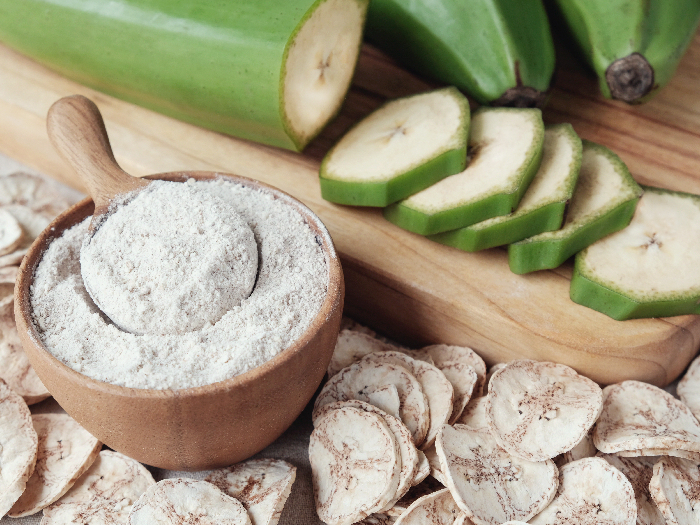When one talks about bananas, the first thing that comes to mind is a delicious banana pudding or a yummy banana shake. While it has been famously used in drinks, shakes, and smoothies, the recent exploration into the new area of gluten-free flours has brought to light our very own and old green banana flour. It has many health and environmental benefits, as well as uses. Let’s take a look below.
What is Banana Flour?
Banana flour, prepared with green bananas has long been in use in Africa. The recent popularity of banana flour is mostly because of its gluten-free nature and resistant starch property. It has also been a popular part of various diets such as the paleo diet and other health trends that support a shift in flour choices from wheat to newer gluten-free options. Banana flour has a mild banana flavor, when uncooked, while the cooked version of this flour develops an earthy and even milder flavor. The texture resembles that of lighter wheat flour. It is also a good source of energy, proteins, carbohydrates, and fiber, as per the USDA. [1]
How to Make
You cannot prepare this flour at home. However, the process to make banana flour involves peeling, chopping, and grinding of green bananas. The process is either done by hand, as per the traditional method, or with a mechanical grinder. For the traditional method, the bananas are dried in the sun or an oven and then ground in a mortar and pestle. It takes around ten kilograms of green bananas to produce around one kilogram of this flour. [3]
Environment-Friendly
Banana flour production has also led to a minimization in waste generated by banana crops, as per researchers. The leftover or unripe banans cannot be consumed and are often just thrown away in the waste. When it comes to making banana flour, these unripe or leftover bananas can be utilized. This directly helps in waste reduction and also promotes higher returns for cultivators. [4]

Green banana flour is an excellent grain-free and gluten-free option. Photo Credit: Shutterstock
Health Benefits
There are many health benefits of banana flour, these include the following.
- Gluten-free alternative: For those suffering from celiac disease or gluten intolerance, this flour is the ideal choice as it is gluten-free.
- Resistant starch: It is also a good source of resistant starch, which works like soluble fiber in the body, as per a research published in the journal Environmental Research and Public Health. This helps the body digest better. [5]
- Potassium-rich: While a lot of the potassium in bananas is lost during the production of its flour, it still retains some of it. This can help in the management of your blood pressure, thereby protecting heart health. [6]
- Zero additives: When sourced from ethical and clean manufacturers or farmers, you can rest assured that this flour contains no additives, preservatives, or sweeteners and is thereby good for overall health and wellbeing.
Uses
Historically, banana flour has been used to replace the expensive wheat and rye flour. It was mainly produced in different parts of Africa and exported to Central America and Australia. There are many uses of this flour, such as baking, cooking, and more. Let’s take a look below. [7]
- Baking & Cooking: When you’re baking with this flour, make sure to use 30% less banana flour than what is suggested for the other flour. This is to say that use 2/3rd cup of banana flour for every one cup of regular flour. Its high starch content makes it a great choice for cooking and baking. You can easily make pasta, bread, cakes, and brownies with this flour. It is also used in puddings sometimes. [8] [9]
- Animal feed: It is often used as animal feed in various places and especially as an ingredient in milk replacers for livestock. [12]
- Ice-cream: As per research published in the Food Technology and Biotechnology [13] journal, ice-cream made with green banana flour is known to have the optimum acidic and pH levels.
You can also use this flour for smoothies, sauces, stews, waffles, crepes, muffins, and cookies.
Word of Caution
There are no health concerns associated with the consumption of banana flour. However, those who are allergic to bananas should avoid it. It should also be noted that banana flour production has often been linked to the exploitation of underprivileged workers, so make sure you get it from a reliable and ethical source. You can buy from brands that have agreed to fair trade and ethical business practices.
